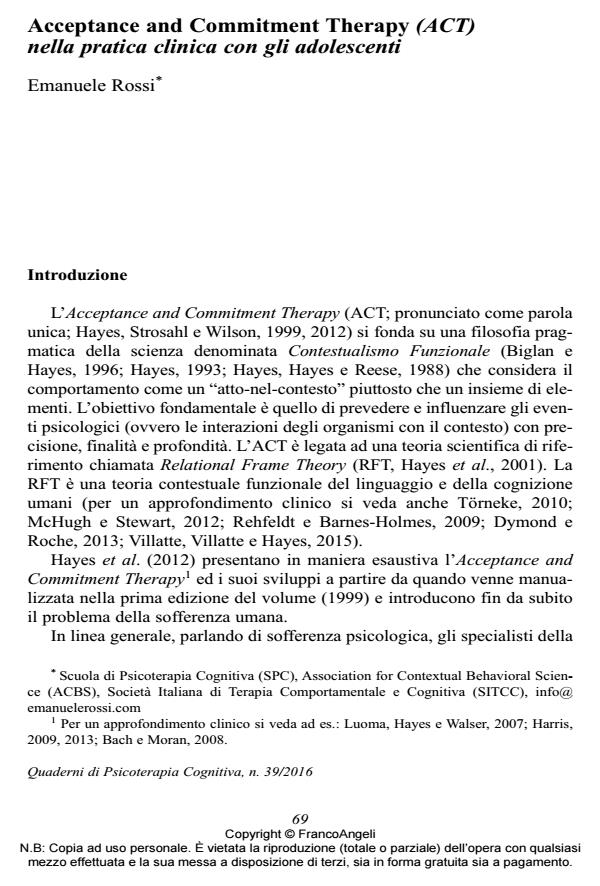Acceptance and Commitment Therapy (ACT) nella pratica clinica con gli adolescenti
Titolo Rivista QUADERNI DI PSICOTERAPIA COGNITIVA
Autori/Curatori Emanuele Rossi
Anno di pubblicazione 2016 Fascicolo 2016/39
Lingua Italiano Numero pagine 14 P. 69-82 Dimensione file 108 KB
DOI 10.3280/QPC2016-039005
Il DOI è il codice a barre della proprietà intellettuale: per saperne di più
clicca qui
Qui sotto puoi vedere in anteprima la prima pagina di questo articolo.
Se questo articolo ti interessa, lo puoi acquistare (e scaricare in formato pdf) seguendo le facili indicazioni per acquistare il download credit. Acquista Download Credits per scaricare questo Articolo in formato PDF

FrancoAngeli è membro della Publishers International Linking Association, Inc (PILA), associazione indipendente e non profit per facilitare (attraverso i servizi tecnologici implementati da CrossRef.org) l’accesso degli studiosi ai contenuti digitali nelle pubblicazioni professionali e scientifiche.
Negli ultimi anni, si e assistito ad un crescente sviluppo di ricerche, manuali e protocolli ACT per adolescenti, nati dalla necessita di considerare i giovani clienti in contesti specifici differenti dall’eta adulta e riconoscere l’esigenza di protocolli strutturati su misura per la clinica in eta evolutiva. In questo contributo saranno introdotti i due piu recenti approcci manualizzati per la pratica clinica ACT con gli adolescenti: ACT for Adolescents (Turrell e Bell, 2016) e The thriving adolescent (Hayes e Ciarocchi, 2015). Questi strumenti clinici rappresentano al momento due delle risorse ACT per adolescenti piu complete. Possono essere utilizzati per costruire una profonda e consistente pratica clinica e generare nei giovani clienti maggiore flessibilita psicologica, consapevolezza mindful nel momento presente, disponibilita e apertura alle proprie emozioni, direzioni di vita significative e in linea con i propri valori.
Parole chiave:Acceptance and Commitment Therapy, adolescenti, flessibilita psicologica.
Emanuele Rossi, Acceptance and Commitment Therapy (ACT) nella pratica clinica con gli adolescenti in "QUADERNI DI PSICOTERAPIA COGNITIVA" 39/2016, pp 69-82, DOI: 10.3280/QPC2016-039005